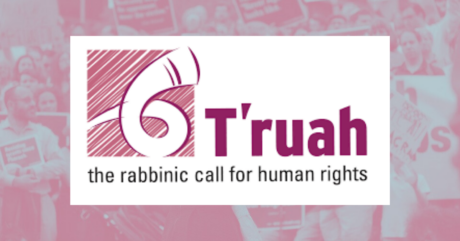NEW YORK – Today the 8th Circuit of Appeals ruled to uphold Arkansas’ law that prohibits the state from contracting with businesses that do not affirm that they will not participate in boycotts of Israel or its territories. In reaction, T’ruah, a rabbinic human rights organization that represents over 2,300 rabbis and cantors and their communities in North America, criticized the Court’s ruling and stated that boycotting is an essential right protected by the First Amendment.
Rabbi Jill Jacobs, CEO of T’ruah, issued the following statement:
“The Eighth Circuit decision is a dangerous one for American democracy, and for our constitutionally-protected right to free speech. By narrowly interpreting NAACP vs. Claiborne Hardware, a case regarding the boycott of white merchants by Black residents of Mississippi, as protecting only expressive speech and not boycott, the court has opened the floodgates to politically motivated restrictions on any form of boycott.
“Judaism has long understood that wisdom comes through argument, even fierce and sometimes uncivil arguments, aimed at reaching a greater truth. The Talmud and our legal literature is filled with pointed verbal battles based in an understanding that one counters speech with more speech.
“T’ruah does not boycott Israel or participate in the Global BDS movement. However, we believe that the right to free speech includes speech with which one disagrees, and that economic boycotts are a protected form of free speech. As an organization, we have supported the call for clothing manufacturers to boycott cotton from China, where it is produced through slave labor by Uyghurs, as well as the Coalition of Immokalee Workers’ boycott of Wendy’s over their refusal to join the Fair Food Program. Many members of our communities have boycotted companies, products, states, and countries for political reasons.
“This is why T’ruah – together with J Street– filed an amicus brief in this case, as well as in similar cases in Texas and Georgia, in which we affirm that boycotts must remain a protected form of free speech for all of us, and not be restricted by political whims, even when we personally or collectively disagree with the motivations behind those boycotts.
“Anti-BDS laws such as the one passed in Arkansas do nothing to protect Jews or to protect Israel, which is ostensibly the reasoning behind Arkansas’s prohibition. A company that refuses to do business with Jews or with Israeli nationals in the US would certainly be guilty of discrimination based on religion or national origin. Countries, by contrast, are not protected under anti-discrimination laws.
“This Eighth Court decision sets a serious and dangerous precedent for free speech in the United States. Texas has already passed laws restricting the state from doing business with companies that ‘discriminate’ against firearms or ammunition manufacturers or fossil fuel companies. Other states have introduced versions of these laws, promoted by American Legislative Exchange Council as model legislation and all based on the anti-BDS laws. If this decision stands, we are likely to see a wholesale erosion of the right to free speech, which is one of the foundational rights of this country.”
T’ruah: The Rabbinic Call for Human Rights mobilizes a network of more than 2,300 rabbis and cantors from all streams of Judaism that, together with the Jewish community, act on the Jewish imperative to respect and advance the human rights of all people. Grounded in Torah and our Jewish historical experience and guided by the Universal Declaration of Human Rights, we call upon Jews to assert Jewish values by raising our voices and taking concrete steps to protect and expand human rights in North America, Israel, and the occupied Palestinian territories.

